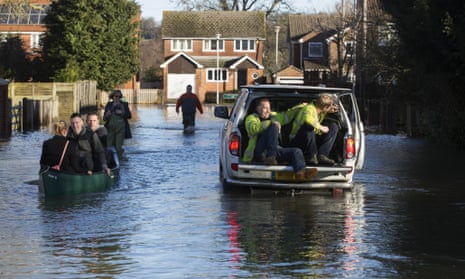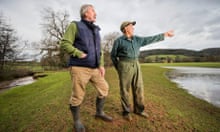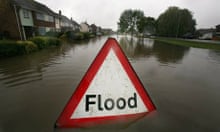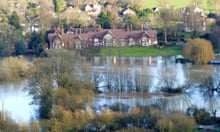Two leading UK climate scientists have endorsed the prime minister’s conviction that global warming is behind the run of recent floods, saying that we are likely to experience more extremes of weather due to climate change.
David Cameron told MPs on Wednesday that he “suspected” that the recent spate of wet weather, which has caused widespread disruption and the loss of several lives, was linked to climate change, though his environment secretary Owen Paterson – widely acknowledged to be sceptical of the extent of human influence on the climate – has held off from making such connections.
Myles Allen of Oxford University and Peter Stott of the Met Office said on Friday that the prime minister was right to make such a connection, and that increasing levels of climate change would have substantial impacts on rainfall.
Both stressed that unusually high rainfall could happen in the absence of global warming, as part of the natural variation of the weather, but that human influence on the climate was making such extremes more frequent.
Scientists still find it very difficult to attribute particular weather events, no matter how extreme, to climate change, as storms, floods, droughts and heatwaves occur naturally. “There is no climate change storm,” said Allen, referring to the difficulty of attributing a single weather event to the changing climate. But he affirmed that there is an increasing likelihood of extreme weather events as humans pump more carbon dioxide into the atmosphere.
Stott said that efforts to make the attribution of extreme events to the effects of climate change were now a major focus of the Met Office's climate change research, which involves world-leading scientists and super-computers crunching vast quantities of past and present weather data. He said Cameron was right to "suspect" a link between recent rainfall and climate change, and that the UK could expect to see more extreme rainfall, but stressed that more work needed to be done to make such attribution clearer.
Last September's report by the Intergovernmental Panel on Climate Change found that manmade greenhouse gases were likely to push average global temperatures beyond the threshold of 2C of warming above pre-industrial levels, which scientists regard as the limit of safety. The IPCC will spell out the impacts of flooding on people and wildlife in a second report in March.
Allen called for more scientific effort to be put into exploring the link between human-caused climate change and extreme weather. He said that it could be possible in future to make a case for the attribution of extreme weather events to climate change, if computer data can be more closely analysed.



